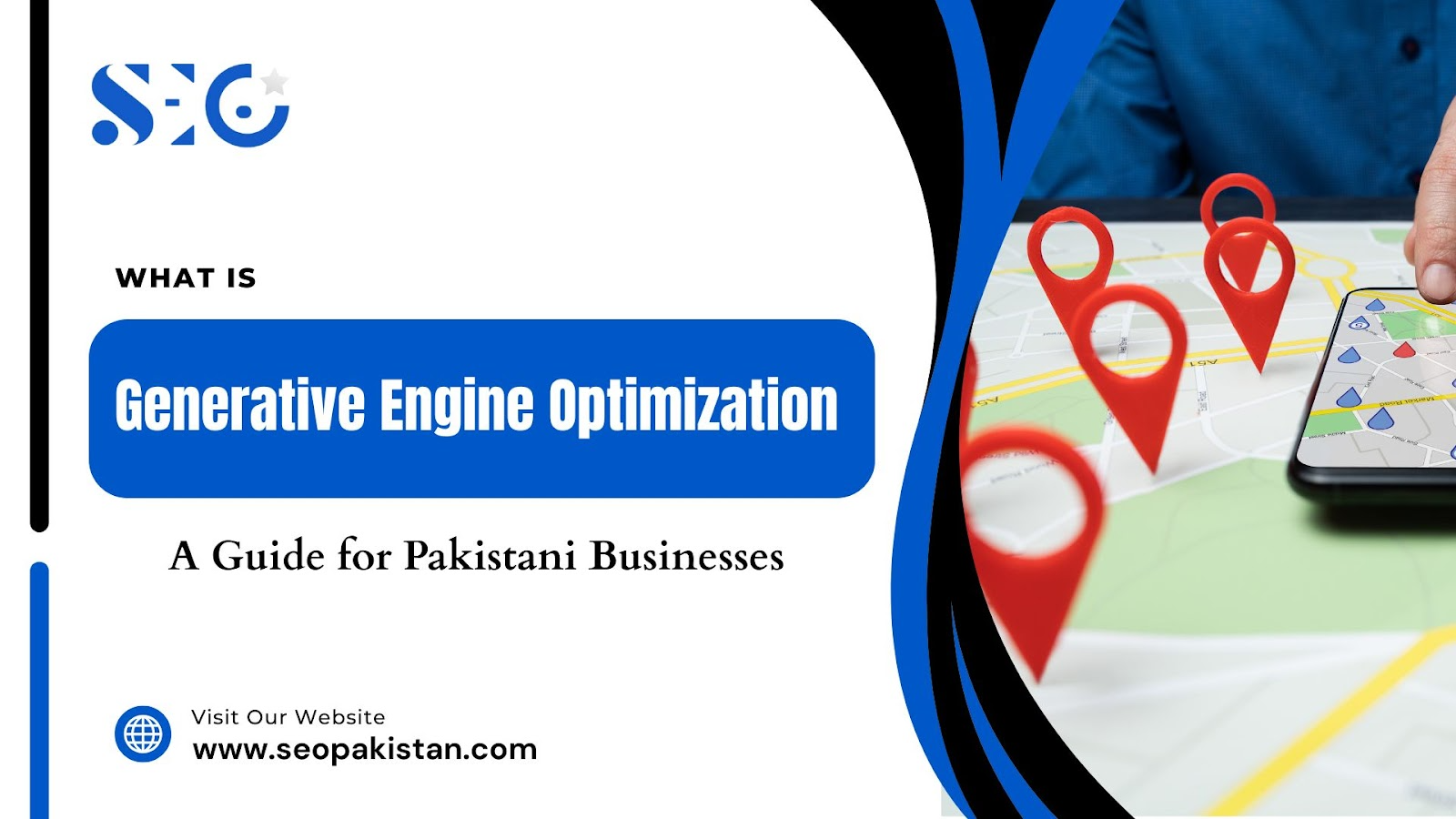Ever noticed how the way you find information online has dramatically changed? Gone are the days of endless scrolling through blue links after typing a simple keyword. Now, we’re asking AI-powered search engines like Google’s AI Overviews, Gemini, and ChatGPT complex questions and getting direct, synthesized answers in return.
This shift isn’t just a trend; it’s a revolution in how users interact with information, demanding a completely new approach to digital marketing. This is where Generative Engine Optimization comes in.
But what does this mean for your business, especially in Pakistan? And how can you ensure your brand isn’t just found, but becomes the trusted source of truth for these intelligent engines?
In this blog post, we will dive deep into this new era of search, exploring why ranking high isn’t enough anymore and how you can adapt to thrive.
The Paradigm Shift
The way we interact with search engines is transforming. Instead of just searching for keywords, users now expect conversational interactions and instant, detailed answers. For businesses in Pakistan, this evolution brings both challenges and opportunities.
- Shift to Conversational Search: Businesses must optimize for natural language queries as users move towards asking search engines complete questions.
- Focus on Instant Answers: Providing direct, relevant information will improve visibility as search engines prioritize content that aligns with AI-driven results.
- Opportunities for Local Businesses: AI platforms can boost visibility for businesses in Pakistan by connecting them with users actively seeking their services.
- Adaptation to AI Trends: Staying updated with AI advancements will be critical for maintaining a competitive edge in this changing digital landscape.
Defining GEO
Generative Engine Optimization (GEO) is the strategic process of creating and optimizing your digital content so that it is cited, sourced, and featured in the responses generated by AI search engines. It is about ensuring your brand’s expertise is recognized and recommended by AI, placing your business directly in the answer the user is seeking.
GEO vs. Traditional SEO

It’s vital to grasp that Generative Engine Optimization (GEO) isn’t a replacement for traditional Search Engine Optimization (SEO). Rather, GEO represents an advanced, essential layer that fundamentally builds upon a robust SEO foundation.
Traditional SEO
Think of it this way: traditional SEO focuses on optimizing your content to be found and ranked by search engine algorithms, ensuring your website appears high in search results. It’s about visibility, traffic, and getting users to click on your links.
GEO
GEO, on the other hand, takes this a step further. It’s about optimizing your content so that AI search engines not only find it, but understand it, trust it, and select it as the authoritative source for their generative responses.
| Feature | Traditional SEO | Generative Engine Optimization (GEO) |
| Primary Goal | Rank on a list of search results. | Be cited in an AI-generated answer. |
| What It Optimizes For | Google’s ranking algorithms. | AI models and their reasoning. |
| Content Objective | Attract clicks with keywords. | Provide direct, authoritative answers. |
| Relationship | The essential foundation for all online visibility. | The evolution built on top of SEO. |
Why GEO Matters for Your Business in Pakistan
For businesses operating in Pakistan’s competitive digital market, embracing GEO is not just an option; it is a necessity for future growth. Adopting this strategy early can provide a significant advantage.
Be a Cited Authority
What is the highest form of digital trust? It is when an AI engine, designed to find the best possible information, cites your business as an authoritative source. This is the ultimate mark of expertise. Being featured in an AI-generated answer significantly boosts brand visibility, builds credibility, and establishes your company as a leader in your industry.
Capture the Voice of Search
How are your customers searching for information today? More and more, they are using natural, conversational language, especially with the rise of voice search and AI assistants. GEO helps your business appear in these conversational queries.
By optimizing for how people actually speak and ask questions, you align your content with the future of search.
Gain a Competitive Edge
GEO is still a relatively new concept, which presents a powerful opportunity. While your competitors in Pakistan remain focused on traditional SEO strategies, you can get ahead.
By adopting GEO principles now, you position your business as a forward-thinking authority, capturing the attention of both AI engines and customers long before others even recognize the shift.
The Core Principles of a Winning GEO Strategy
A successful GEO strategy is rooted in creating high-quality, trustworthy content and making it easily accessible to AI models. It requires a focused effort on demonstrating your expertise across the digital ecosystem.
Focus on High-Quality, Authoritative Content
Why should an AI trust your content over others? The answer lies in Google’s E-E-A-T guidelines, which stand for Experience, Expertise, Authoritativeness, and Trustworthiness. AI models are trained to recognize these signals.
- Demonstrate Real-World Experience: Create content that shows you have hands-on experience with your subject matter. Share case studies, original research, and unique insights that cannot be found elsewhere.
- Showcase Expertise: Write comprehensive, detailed content that thoroughly answers user questions. Go beyond surface-level information and provide deep, practical value.
- Cite Credible Sources: Back up your claims with data and citations from other reputable sources. This shows that your content is well-researched and trustworthy.
Optimize for Natural Language and User Intent

How can you make your content more appealing to AI? You must shift your focus from rigid keywords to the semantic meaning behind a user’s query. It is about understanding the why behind the search.
- Write Conversationally: Structure your content to answer common questions directly and concisely. Use a natural, human tone that is easy for both users and AI to understand.
- Use Structured Data: Implement tools like FAQ sections and “how-to” guides within your content. This formatting makes it simple for AI to extract clear answers.
- Address User Intent: Anticipate the follow-up questions your audience might have and answer them proactively within your content, creating a truly comprehensive resource.
Build Your Digital Footprint Beyond Your Website
Where does an AI look for information about your brand? It looks everywhere. AI engines do not just crawl your website; they pull information from across the entire web to build a complete picture of your authority.
- Secure High-Authority Mentions: Earn citations and mentions on reputable industry websites, news outlets, and blogs.
- Engage on Relevant Platforms: Participate in discussions on forums like Reddit, Quora, and industry-specific groups where your expertise is relevant.
- Optimize Local and Social Profiles: Ensure your brand information is consistent and accurate across all local directories and social media platforms. Every mention contributes to your digital authority.
Actionable Steps to Get Started with GEO
Integrating GEO into your digital strategy does not require you to start from scratch. You can begin by optimizing your existing assets and adopting new processes for future content creation.
Audit Your Existing Content
First, review your current blog posts, service pages, and articles. Ask yourself: Does this content directly answer a user’s question? Does it demonstrate clear authority on the topic?
Identify your most valuable content and look for opportunities to update it with more detail, unique insights, and better structure to align with GEO principles.
Implement Structured Data
Structured data, or schema markup, is code you add to your website to help search engines understand the context of your content. For example, using the FAQPage schema for a question-and-answer section explicitly tells AI models that this part of your page contains answers to specific questions, making it easier for them to feature you.
Create Topic Clusters
To position your website as a definitive knowledge hub, adopt the topic cluster model. This SEO strategy organizes your content in a way that signals deep expertise to search engines and AI models.
The structure consists of a central “pillar” page focused on a broad topic, which then links out to multiple “cluster” pages, each covering a specific subtopic in greater detail.
Here’s a step-by-step method to create effective topic clusters:
- Identify Core Topics: Start by brainstorming the main subjects your audience cares about and that are central to your business. These will become your pillar pages. For instance, if you sell marketing software, a core topic could be “Content Marketing.”
- Develop Subtopics: For each core topic, identify related, more specific subtopics. These will form your cluster content. For “Content Marketing,” subtopics could include “blogging for beginners,” “video marketing strategies,” or “SEO content writing.” Use keyword research tools to find questions and long-tail keywords your audience is searching for.
- Create Your Pillar Page: Write a comprehensive, long-form guide on the core topic. This pillar page should cover all the essential aspects of the subject, acting as a definitive resource. Within this page, you will link out to your more detailed cluster pages.
- Write In-Depth Cluster Content: Create individual articles, blog posts, or pages for each subtopic. These should offer deep dives into the specifics. Crucially, each cluster page must link back to the main pillar page.
- Establish Internal Links: The linking structure is vital. The pillar page must link to every cluster page. In turn, every cluster page must link back to the pillar page. This creates a closed loop, signaling a strong topical relationship to search engines.
Monitor and Adapt
GEO is not a one-time task; it is an ongoing process. Stay informed about the latest developments in AI search technology. Use tools to track where and how your brand is being mentioned in AI-generated answers. Continuously analyze what works and adapt your strategy to maintain your competitive edge.
Final Thoughts
The digital landscape is evolving, and Generative Engine Optimization is at the forefront of this change. The goal is no longer just to be visible but to become a verified, trusted source for AI-driven search.
GEO is not a replacement for traditional SEO but an essential evolution for any business in Pakistan that wants to achieve sustainable, long-term growth. By focusing on authority, optimizing for natural language, and building a strong digital footprint, you can ensure your business thrives in the new era of search.
Are you ready to future-proof your digital marketing and become the authority AI chooses? Contact SEO Pakistan today for a consultation and learn how we can integrate a powerful GEO strategy into your business.
Frequently Asked Questions
What is Generative Engine Optimization (GEO)?
GEO is the process of creating and optimizing your digital content to be selected and cited by AI-powered search engines like Google’s AI Overviews and ChatGPT.
Is GEO replacing Traditional SEO?
No, GEO is not a replacement for Traditional SEO; it’s an evolution. Traditional SEO provides the essential foundation (technical health, keywords, backlinks), while GEO is a new layer built on top of it, focusing on adapting content for AI-driven search.
How is the content for GEO different from SEO?
- For Traditional SEO, content is often optimized for keywords and link building to rank high in a list.
- For GEO, content must be more authoritative, conversational, and direct, written to answer user questions clearly so that an AI model can easily extract and use it.
How does GEO affect website traffic?
GEO can lead to “zero-click” searches, where the user gets their answer directly from the AI without visiting your website. However, a successful GEO strategy can lead to a significant increase in brand mentions and direct searches for your company, ultimately driving high-quality, high-intent traffic.













